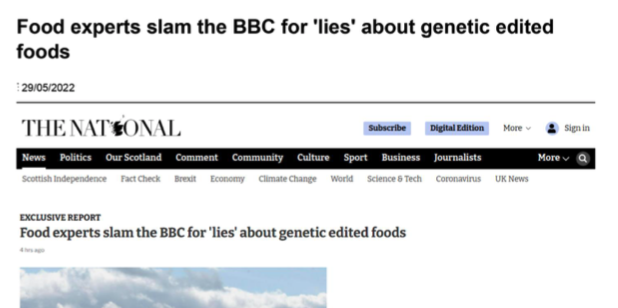
Scottish paper highlights powerful criticisms of UK media reporting on bill deregulating gene editing
Two reports in a Scottish daily newspaper have highlighted powerful criticisms of UK media reporting on gene editing in the context of the Boris Johnson government’s new bill on deregulating gene-edited plants and animals in England.
The first of these stories about media misrepresentation hit the papers last weekend under the headline, Food experts slam the BBC for “lies” about gene-edited foods. In an exclusive, the National’s political correspondent, Xander Richards, reported accusations that the BBC and other media have been “repeating uncritically and ad nauseam” UK Government “lies” about gene-edited foods.
Richards noted how the BBC in its reporting in multiple stories on its website had contrasted gene editing, which it presented as just involving “snipping out a small piece of DNA”, with genetic modification, which it said “involves adding genes, sometimes from a different species”.
The article went on to quote an expert on genetic engineering, London-based molecular geneticist Dr Michael Antoniou, as saying such reporting “misrepresented” the facts because the UK government’s bill deregulating gene editing actually included the insertion of foreign DNA as “part and parcel of the deregulation”.
Dr Antoniou said, “It’s not as if what’s being deregulated is only gene edits that tweak or destroy the function of the genes which are already there, it’s also the insertion of foreign genetic material. They’re basically deregulating all manner of genetic manipulations of crops.”
But in a just-published followup headlined, BBC refuses to correct errors about UK Government's Genetic Technology Bill, the National reports that despite its having asked the BBC more than once if it would be correcting the errors in its stories, the BBC repeatedly refused to do so, with a BBC spokesperson saying the corporation stood by its journalism.
Pat Thomas, the director of Beyond GM, told the paper: “In refusing to correct the factual errors in its story, the BBC is ensuring misinformation remains in the public domain, and has revealed its bias and its willingness to pervert and obstruct any honest debate about what (these) technologies are and how they should be regulated.”
The National’s original article also quoted Pat Thomas as saying that it was Boris Johnson government’s that had encouraged the spread of the false narrative that, unlike old school GM, gene editing doesn’t involve inserting foreign genes: “The Government’s case for deregulation depends on embedding the myth that gene editing is different from genetic modification”.
She said just how misleading this was could be judged by the fact that the first two gene-edited crops being given the go-ahead under the new rules both apparently involved the insertion of foreign genes.
Cathie Martin, a scientist at the John Innes Centre who developed one of these crops – a vitamin D-containing tomato – admitted to the National that the process did involve inserting foreign genes, but she claimed that with gene editing these kind of transgenes (i.e. genes from another organism) were removed from the plants before they reached the market.
Martin compared it to putting in stitches to a wound during a medical operation. “You couldn’t say there was no foreign material while the stitches are there, but you can remove the stitches and there is none any more.”
But Michael Antoniou, who has worked routinely over many years with different methods of genetic engineering, including gene editing, told the paper that removing the foreign DNA used for gene editing would never be as clean a process as having stitches taken out.
“The gene-editing tool DNA can fragment and bits of it can randomly insert in many locations around the DNA of the plant, and that is not being checked for,” Dr Antoniou explained. “At each one of the stages of the gene-editing process, you introduce unintended genetic alterations running into the hundreds of thousands. Even the process of growing plant cells in the laboratory introduces hundreds of sites of DNA damage. You end up with a plant that carries a high burden of unintended DNA damage with unknown downstream consequences.”
Antoniou said that these “scientific facts are being ignored”, and he argued that any idea that the outcomes of widespread use of gene-edited products can be predicted is pure “fantasy”.
Dr Antoniou was also critical of the government’s claims that gene-edited organisms could have been produced naturally.
“There’s no resemblance to the process that occurs naturally,” he told the paper. “Gene editing is completely and utterly different and it is, without doubt, an intentional artificial genetic modification.”
He also attacked the fact that deregulation meant gene-edited products wouldn’t just fail to be safety checked but would also not be labelled, so people couldn’t choose to avoid them: “They’re literally ripping up the rulebook on all types of genetic modification procedures and being completely dishonest to the science in the process.”
Scotland and Wales are being pressured by the Westminster government to also deregulate gene editing but Dr Antoniou praised the devolved nations for “being true to the science that tells you that this thing is not precise, it’s not predictable and it needs to remain regulated”. And in the light of that he said he would congratulate the Scottish and Welsh governments if they maintained their opposition to gene editing and continued to “exclude it from cultivation in their territories”.










